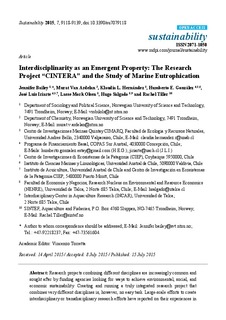Interdisciplinarity as an Emergent Property: The Research Project “CINTERA” and the Study of Marine Eutrophication
Bailey, Jennifer L.; Ardelan, Murat Van; Hernández, Klaudia L.; González, Humberto E.; Iriarte, Jose Luis; Olsen, Lasse Mork; Salgado, Hugo; Tiller, Rachel Gjelsvik
Journal article, Peer reviewed
Permanent lenke
http://hdl.handle.net/11250/2391231Utgivelsesdato
2015Metadata
Vis full innførselSamlinger
- Institutt for kjemi [1399]
- Institutt for sosiologi og statsvitenskap [2852]
- Publikasjoner fra CRIStin - NTNU [38525]
Sammendrag
Research projects combining different disciplines are increasingly common and sought after by funding agencies looking for ways to achieve environmental, social, and economic sustainability. Creating and running a truly integrated research project that combines very different disciplines is, however, no easy task. Large-scale efforts to create interdisciplinary or transdisciplinary research efforts have reported on their experiences in trying to achieve this goal. This article shares the methods, challenges and achievements experienced by a smaller group of researchers who have developed an interdisciplinary approach based on former results of Norwegian and Chilean experiments. The project “A Cross-disciplinary Integrated Eco-system Eutrophication Research and Management Approach” (CINTERA), funded by the Research Council of Norway (RCN, project 216607), brings together the fields of political science, economics, marine biology/oceanography and marine bio-geo-chemistry to improve the understanding of marine eutrophication and its possible socio-economic impacts. CINTERA is a multidisciplinary project that evolved into an interdisciplinary project and in so doing, transformed the attitudes of participants. The transformative process was generated particularly by the need to work closely together in making the CINTERA project useful for policy-makers.

